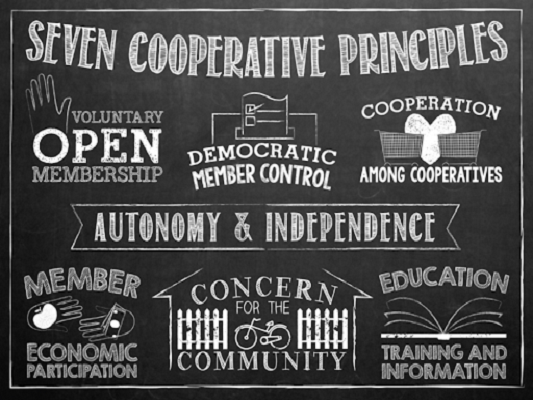|
Cooperatives all around the world operate according to the same set of core principles and values, adopted by the International Co-operative Alliance. Cooperatives trace the roots of these principles to the first modern cooperative founded in Rochdale, England in 1844. These principles are a key reason that America’s credit unions operate differently from other financial service providers, putting the needs of their members first. In anticipation for ICU Day tomorrow, let’s all take a moment to review, and be proud of our cooperative heritage.
Seven Cooperative Principles for Credit Unions 1. Voluntary Membership Credit unions are voluntary, cooperative organizations, offering services to people willing to accept the responsibilities and benefits of membership, without gender, social, racial, political or religious discrimination. Many cooperatives, such as credit unions, operate as not-for-profit institutions with volunteer board of directors. In the case of credit unions, members are drawn from defined fields of membership. 2. Democratic Member Control Cooperatives are democratic organizations owned and controlled by their members, one member one vote, with equal opportunity for participation in setting policies and making decisions. 3. Member Economic Participation Members are the owners. As such they contribute to, and democratically control, the capital of the cooperative. This benefits members in proportion to the transactions with the cooperative rather than on the capital invested. For credit unions, which typically offer better rates, fees and service than for-profit financial institutions, members recognize benefits in proportion to the extent of their financial transactions and general usage. 4. Autonomy and Independence Cooperatives are autonomous, self-help organizations controlled by their members. If the cooperative enters into agreements with other organizations or raises capital from external sources, it is done so based on terms that ensure democratic control by the member and maintains the cooperative autonomy. 5. Education, Training and Information Cooperatives provide education and training for members, elected representatives, managers and employees so they can contribute effectively to the development of the cooperative. Credit unions place particular importance on educational opportunities for their volunteer directors, and financial education for their members and the public, especially the nation’s youth. Credit unions also recognize the importance of ensuring the general public and policy makers are informed about the nature, structure and benefits of cooperatives. 6. Cooperation Among Cooperatives Cooperatives serve their members most effectively and strengthen the cooperative movement by working together through local, state, regional, national, and international structures. 7. Concern for Community While focusing on member needs, cooperatives work for the sustainable development of communities, including people of modest means, through policies developed and accepted by the members. Comments are closed.
|
The MemoThe Memo is DakCU's newsletter that keeps Want the Memo delivered straight to your inbox?
Archives
July 2024
Categories
All
|
|
Copyright Dakota Credit Union Association. All Rights Reserved.
2005 N Kavaney Dr - Suite 201 | Bismarck, North Dakota 58501 Phone: 800-279-6328 | [email protected] | sitemap | privacy policy |





